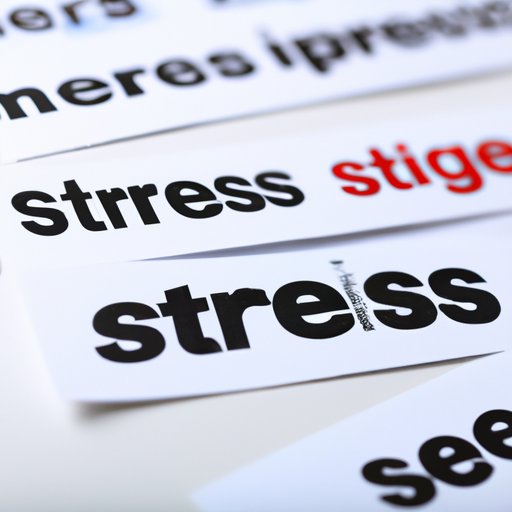
Introduction
Stress has become a ubiquitous term in our everyday lives, and despite how often it is used, people often have only a vague understanding of what it is. Stress can be experienced in different ways, be it physiological or emotional, and can have both positive and negative impacts on our lives.
In this article, we will explore the meaning and impact of stress, its effects on the body and mind, the connection between stress and mental health, and some effective strategies for managing stress. By the end of this article, you’ll have a better grasp of this fascinating topic that impacts every human being.
Demystifying Stress: Understanding the Definition and Impact
Stress is an inevitable fact of life. It refers to the body’s natural response to any change that requires an emotional, mental, or physical response. Stress can be triggered by anything that causes anxiety, fear, anger, or frustration.
Stress can be acute or chronic and can have both positive and negative impacts on our lives. Positive stress, referred to as eustress, can motivate us to work hard, encourage us to take risks, and help us grow and develop into stronger individuals. Negative stress, on the other hand, can be harmful, causing physical or emotional strain, and, if left unchecked, can lead to chronic health conditions.
Stress affects physical and mental health in different ways. The effects of stress may manifest in the form of headaches, stomach upsets, changes in appetite, muscle tension, and other physical discomforts. On the other hand, stress can also impact mental health, leading to anxiety, depression, and other mood disorders.
It is essential to recognize the impact of stress in our daily lives. Recognizing stressors, the root causes of stress, and learning to manage stress effectively can go a long way in improving overall well-being.
The Physiology of Stress: How Our Body Responds to Threats
The body’s response to stress is known as the “fight or flight” response. When we encounter a perceived threat, such as a dangerous animal or a stressful work situation, our body produces a cascade of hormones, including cortisol and adrenaline. These hormones trigger physical changes in our body, such as an increase in heart rate, blood pressure, and respiration.
These physiological changes are meant to prepare the body to take action in response to the perceived threat. By increasing the heart rate and breathing, oxygen is transported more effectively to our muscles and brain, providing us with the energy and clarity of mind to fight or run away.
While these changes can be helpful in some situations, prolonged exposure to stress can lead to chronic health issues. Stress can affect the immune, digestive, and cardiovascular systems, leaving us more susceptible to ailments and chronic diseases.
The Surprising Benefits of Stress: The Good, The Bad, and The Ugly
Despite the negative effects of stress, it can also have several benefits. Short-term stress, for example, can improve cognitive function, increase productivity and creativity, and even boost immune function.
However, prolonged exposure to stress can lead to chronic health conditions, including heart disease, obesity, and type 2 diabetes. Chronic stress can also lead to mood disorders, such as depression and anxiety.
To balance the pros and cons of stress, it is essential to manage it effectively by prioritizing stress-reducing activities such as exercise, meditation, and other relaxation techniques.
The Connection Between Stress and Mental Health: Defining the Link
Stress can exacerbate existing mental health conditions, such as anxiety and depression. When stress levels rise, people prone to anxiety can experience an increase in fear and worry, while those with depression can become even more withdrawn and hopeless.
Recognizing the signs of stress is critical in addressing the root causes of mental health conditions. It is essential to seek professional help when necessary.
Navigating Stressful Situations: Tips and Tricks for Managing Stress
Managing stress can be challenging, but there are effective strategies to help navigate stressful situations. Learning to identify and control stressors can help to reduce stress levels. Regular exercise, meditation, and other relaxation techniques can also be helpful in managing stress.
If you’re experiencing workplace stress, it’s essential to communicate your concerns to your supervisor and seek help to find a solution.
Conclusion
In conclusion, stress is a part of life that has both positive and negative impacts on our physical and mental well-being. Managing stress effectively is essential to overall health and happiness.
By understanding stress and its impact on the body, mind, and mental health, we can begin to take action to manage stress effectively. Through the utilization of techniques such as exercise, meditation, and relaxation techniques, individuals can take control of stress, leading to an improved overall quality of life.




